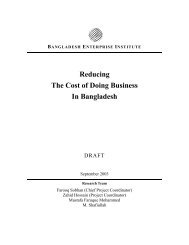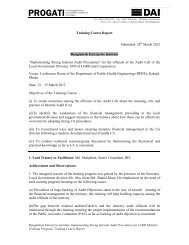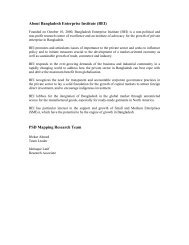Bangladesh Social Enterprise Project - Bangladesh Enterprise Institute
Bangladesh Social Enterprise Project - Bangladesh Enterprise Institute
Bangladesh Social Enterprise Project - Bangladesh Enterprise Institute
Create successful ePaper yourself
Turn your PDF publications into a flip-book with our unique Google optimized e-Paper software.
with concessional tax treatment, be able to unfairly compete with conventional<br />
businesses, and we believe that this is a reasonable concern. As identified earlier,<br />
conventional businesses play a key role in value creation and economic development<br />
and should not be crowded out by social enterprise, which should play a quite distinct<br />
role rather than competing directly for markets, resources and Government support.<br />
We also believe that the lack of consensus on a definition of social enterprise in<br />
<strong>Bangladesh</strong> (and elsewhere) means that much time could be wasted, by entrepreneurs<br />
and Government alike, in trying to enshrine a definition in law, lobbying, and skewing<br />
business structures to qualify for particular benefits.<br />
3. We recommend that the Government does not consider any changes in current<br />
company law to provide separate and distinct provisions for business organisations,<br />
whether for‐profit or not‐for‐profit, which may be deemed informally or formally as<br />
social enterprises.<br />
4. Instead, we recommend that the Government, in concert with civil society and the<br />
private sector, and teamed with a suitable not‐for‐profit organisation, support the<br />
creation of a “brand” or “label” that, through meeting various criteria, may allow<br />
entities to be badged by an independent source (perhaps the centre for excellence) as a<br />
recognised social enterprise.<br />
5. We recommend that Government plays a role in encouraging large <strong>Bangladesh</strong>i<br />
companies and multinationals to engage more with local small and medium enterprises,<br />
primarily through a “light‐touch” approach of setting expectations that large companies<br />
will contribute to economic development and playing a convening role to overcome the<br />
information gap faced by SMEs. This might be best achieved through an annual<br />
dialogue and “reporting back” process led by Government and the various business<br />
chambers.<br />
BSEP: Policy Brief<br />
Page 12














